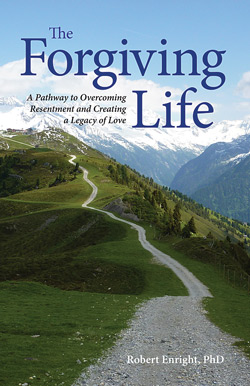Our Forgiveness Blog
Persistence: The Path to Becoming Forgivingly Fit
Should I Forgive?
Excerpt from pages 37-38 of the book, The Forgiving Life by Dr. Robert Enright:
.
 Nietzsche said that only the weak forgive. In other words, if you have to keep a job, then you forgive. If you find another job, then you can boldly tell that boss where he can go as you strut out the door. Yet, is this philosopher Nietzsche talking about genuine forgiveness? I don’t think so.
Nietzsche said that only the weak forgive. In other words, if you have to keep a job, then you forgive. If you find another job, then you can boldly tell that boss where he can go as you strut out the door. Yet, is this philosopher Nietzsche talking about genuine forgiveness? I don’t think so.Checking in Regarding Your Unfolding Love Story
At the beginning of this year, we posted a reflection here in which we encouraged you to grow in love as your legacy of 2017.
One way to start is by looking backward at one incident of 2017 so far.
Please think of one incident with one person in which you were loved unconditionally, perhaps even surprised by a partner or a parent or a caring colleague.
Think of your reaction when you felt love coming from the other and you felt love in your heart and the other saw it in your eyes. What was said? How were you affirmed for whom you are, not necessarily for something you did? What was the other’s heart like, and yours?
Can you list some specific, concrete ways in which you have chosen love over indifference? Love over annoyance? If so, what are those specifics and how are they loving? We ask because 2017 is about 25% over. Have you engaged in 25% of all the loving responses that you will leave in this world this year?
This exercise is meant to show you this: You know love. Now the key is to persevere and deliberately strive to love on a daily basis.
Tempus fugit. If you have not yet deliberately left love in the world this year, there is time…..and the clock is ticking.
Robert
The Mathematics of Forgiveness
When we are treated deeply unjustly by others, we have a tendency to be wounded in at least eight ways. First is the injustice itself. Second is the emotional reaction, such as considerable anger or frustration or sadness. Third, we sometimes feel shame because others are looking and wondering. Fourth, all of the above can make us tired. Fifth, we sometimes can’t stop thinking about what happened. Sixth, as we compare ourselves to the one who hurt us, we see ourselves as coming up short. Seventh, we sometimes have to make unwanted changes in our lives. And eighth, we drift into pessimism.
One injustice, eight wounds. Now, suppose one person hurt you deeply 20 times. That is 20 X 8 = 160 wounds you are carrying around inside of you.
Suppose further that 5 other people have hurt you 10 times each……just wait a minute., please….doing the math here……That is 400 more wounds. Adding the first person who hurt you to the other five who hurt you and look. You are carrying around at least 560 wounds inside of you.
Injustice has a way of making us round-shouldered if you think about it. But be of good cheer. Forgiveness properly practiced can eliminate most of these wounds, allowing you to stand up straight perhaps for the first time in years.
Do the math…..then please consider forgiving.
Robert
A Specific Forgiveness Exercise for Couples
Those of you who have the absolute perfect spouse, please raise you hand……anyone?
Now, those of you who are the absolute perfect spouse, please raise your hand…..I see no hands up.
OK, so we have established that we are not perfect and neither is our partner. Yet, we can always improve. Note carefully that I am not suggesting that you read this to improve your partner. I write it to improve you, the reader.
Here is a little exercise that I recommend for any couple. Together, talk out the hurts that you received in your family of origin, where you grew up. Let the other know of your emotional wounds. This exercise is not meant to cast blame on anyone in your family of origin. Instead, the exercise is meant for each of you to deepen your insight into who your partner is. Knowing his wounds is one more dimension of knowing him as a person. As you each identify the wounds from your past, try to see what you, personally, are bringing into the relationship from that past. Try to see what your partner is bringing from the past to your relationship.
Now, together, work on forgiving those from your family of origin who have wounded you. Support one another in the striving to grow in the virtue of forgiveness. The goal is to wipe the resentment-slate clean so that you are not bringing those particular wounds to the breakfast table (and lunch table and dinner table) every day.
virtue of forgiveness. The goal is to wipe the resentment-slate clean so that you are not bringing those particular wounds to the breakfast table (and lunch table and dinner table) every day.
Then, when you are finished forgiving those family members from the past, work on forgiving your partner for those wounds brought into your relationship, and at the same time, seek forgiveness from him or her for the woundedness you bring to your relationship. Then, see if the relationship improves. All of this is covered in greater depth in my book, The Forgiving Life.



